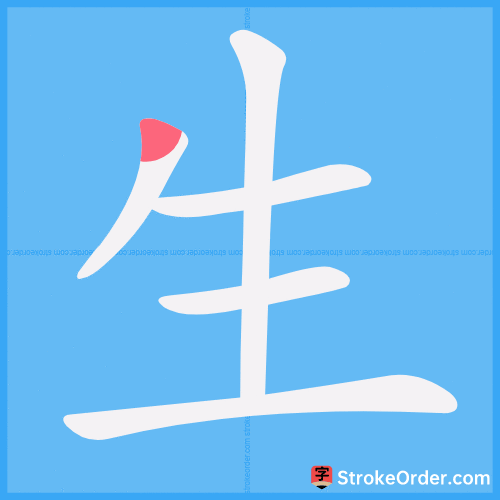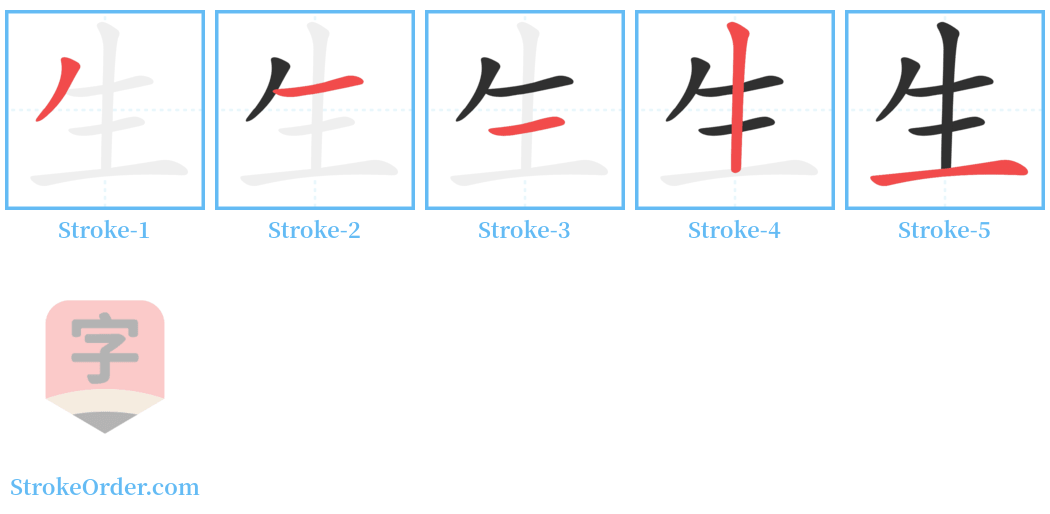生 Stroke Order
Animated Stroke Order of 生

Stroke Order Diagrams for 生

Step-by-Step Handwriting Guide for 生

Learn to Write Chinese Characters with Video Tutorials
Watch the video of writing the Chinese character "生", learn the correct stroke order (笔顺) of the character "生", and master the standard way of writing the character "生".
Free Printable Handwriting Practice with Stroke Order: 生
Printable Writing Practice Worksheet of "生" in Portrait Orientation (Tian Zi Ge)

Printable Writing Practice Worksheet of "生" in Landscape Orientation (Tian Zi Ge)

Information of 生
Pinyin
shēng
Radical
生
Strokes
5 strokes
Usage
★★★★★
Definition
to be born / to give birth / life / to grow
生 [shēng]
动 (Verb)
1. 一切可以发育的物体在一定条件下具有了最初的体积和重量,并能发展长大:诞生,滋生,生长。
(Everything that can develop has obtained its initial volume and weight under certain conditions and can grow: to be born, to nurture, to grow.)
2. 造出:生产。
(To create: to produce.)
3. 活的,有活力的:生存,生命,生物,生机,出入生死,舍生取义。
(Living, full of vitality: to exist, life, living things, vitality, the interplay of life and death, sacrificing life for righteousness.)
4. 有生命的东西的简称:众生,丧生,卫生。
(Abbreviation for living things: all living beings, losing life, hygiene.)
5. 生活,维持生活的:生计,生意。
(Life, sustaining life: livelihood, business.)
6. 整个生活阶段:一生,平生,今生。
(Entire life stages: a lifetime, life, this life.)
7. 发出,起动:生病,生气,生效,生花之笔,谈笑风生。
(To emit, to initiate: to get sick, to get angry, to take effect, to create something beautiful, to have lively conversations.)
8. 使燃料燃烧起来:生火。
(To ignite fuel: to start a fire.)
9. 植物果实不成熟:生瓜。
(Unripe fruits of plants: immature melons.)
10. 未经烧煮或未烧煮熟的:生饭,生水。
(Uncooked or not thoroughly cooked: raw rice, raw water.)
11. 不熟悉的,不常见的:生疏,生客,生字,陌生。
(Unfamiliar, rare: strange, unfamiliar guest, unfamiliar word, stranger.)
12. 不熟练的:生手。
(Unskilled: novice.)
13. 未经炼制的:生铁。
(Unrefined: pig iron.)
14. 硬:态度生硬。
(Hard: stiff attitude.)
15. 甚,深:生怕,生疼。
(Very, deeply: very afraid, very painful.)
16. 正在学习的人:学生,门生。
(A person who is learning: student, disciple.)
17. 有学问或有专业知识的人:儒生,医生。
(A knowledgeable or specialist person: scholar, doctor.)
18. 传统戏剧里扮演男子的角色:小生,老生,武生。
(Role of male character in traditional drama: young male actor, old male actor, martial male actor.)
19. 词尾:好生休养。
(Word suffix: good nurture.)
20. 姓。
(Surname.)
名 (Noun)
1. 生命。
(Life.)
2. 人的一生。
(A person's lifetime.)
3. 生活。
(Living.)
4. 指生日。
(Referring to birthday.)
5. 后生,长辈对晚辈的称呼。
(Descendants, term for younger generation used by elders.)
6. 生物。
(Living things.)
7. 生计,谋生手段。
(Livelihood, means of making a living.)
8. 老师称弟子,或弟子自称;学生。
(A term for students, used by teachers for disciples or by disciples themselves.)
9. 戏剧角色名。
(The male character in Beijing opera.)
10. 妓女。
(Prostitute.)
11. 俘虏。
(Captive.)
12. 年长有学问、有德行的人。“先生”的省称。
(An older, knowledgeable, and virtuous person; abbreviation for "teacher.")
13. 儒生;读书人的通称。
(Scholar; general term for literati.)
14. 通“性”。资质;禀赋。
(Refers to nature; intelligence; natural endowment.)
15. 姓。
(Surname.)
形 (Adjective)
1. 天生,生来。
(Innate.)
2. 生的,未煮熟的。
(Raw, uncooked.)
3. 新鲜的。
(Fresh.)
4. 未开垦种植的(土地)。
(Uncultivated land.)
5. 生疏。
(Strange; unfamiliar.)
6. 具有活力的。
(Vivid.)
副 (Adverb)
1. 机械地,无意识地。
(Mechanically, unconsciously.)
2. 很、甚、极其。
(Very.)
Input Method for 生
Pinyin
sheng1
Wubi
tgd
Cangjie
hqm
Zhengma
mc
Four Corner
25100
Unicode
U+751f
Same Pronunciation Characters